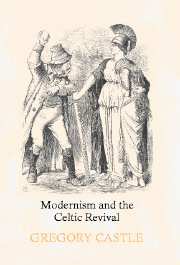Book contents
- Frontmatter
- Contents
- Acknowledgments
- List of abbreviations
- 1 The Celtic muse: anthropology, modernism, and the Celtic Revival
- 2 “Fair equivalents”: Yeats, Revivalism, and the redemption of culture
- 3 “Synge-On-Aran”: The Aran Islands and the subject of Revivalist ethnography
- 4 Staging ethnography: Synge's The Playboy of the Western World
- 5 “A renegade from the ranks”: Joyce's critique of Revivalism in the early fiction
- 6 Joyce's modernism: anthropological fictions in Ulysses
- Conclusion: After the Revival: “Not even Main Street is Safe”
- Notes
- Select bibliography
- Index
6 - Joyce's modernism: anthropological fictions in Ulysses
Published online by Cambridge University Press: 24 November 2009
- Frontmatter
- Contents
- Acknowledgments
- List of abbreviations
- 1 The Celtic muse: anthropology, modernism, and the Celtic Revival
- 2 “Fair equivalents”: Yeats, Revivalism, and the redemption of culture
- 3 “Synge-On-Aran”: The Aran Islands and the subject of Revivalist ethnography
- 4 Staging ethnography: Synge's The Playboy of the Western World
- 5 “A renegade from the ranks”: Joyce's critique of Revivalism in the early fiction
- 6 Joyce's modernism: anthropological fictions in Ulysses
- Conclusion: After the Revival: “Not even Main Street is Safe”
- Notes
- Select bibliography
- Index
Summary
Slumming. The exotic, you see.
James JoyceJames Joyce's modernism has always been something of a problem for his critics, in part because the stylistic and narrative innovations of a text like Ulysses comports uneasily with cultural attitudes toward Ireland, nationalism, and race that determine characterization and theme. Joyce's Irishness, when it is not subordinated to considerations of style and narrative, frustrates those critics who wish to read his work in the context of an Anglo-European tradition of modernism that eschews the local in favor of a pan-historical universalism typically marked by an emphasis on non-Western modes of religious transcendence (which we see in T. S. Eliot's The Wasteland) or the kind of “ply-on-ply” historicism that we see in Ezra Pound's Cantos and Virginia Woolf's Between the Acts. The most famous attempt to assimilate Joyce's work to this tradition of modernism, Eliot's review of Joyce's Ulysses, interpreted the Homeric analogies signaled by the title as evidence of its intention to propound a mythic method that would order “the immense panorama of futility and anarchy which is contemporary history.” More recent estimations of Ulysses, especially those that focus on the political and cultural dimensions of Joyce's Dublin, have advanced what we might call a historical method concerned less with explicating mythic parallels than with the problems of race, gender, class, colonialism, nationalism, and an array of related topics.
- Type
- Chapter
- Information
- Modernism and the Celtic Revival , pp. 208 - 247Publisher: Cambridge University PressPrint publication year: 2001



